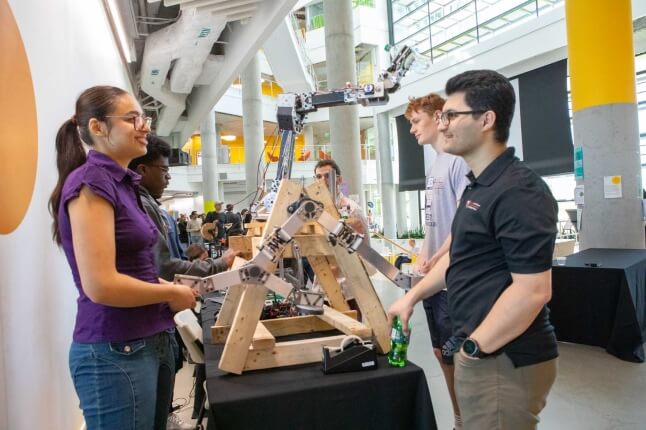News
Diversity in STEM speaker series highlights succeesses and setbacks
The “I’ll Make Me a World” Voices for Diversity in STEM Speaker Series brought together a panel of highly accomplished professionals who are advocates for diversity in STEM (Science, Technology, Engineering, and Math). The panelists shared their experiences and perspectives on improving access to STEM education and career opportunities.
The panel, part of the second annual Annual Building Relationships, Increasing Diversity, and Growing Engineers (BRIDGE) week at the Harvard John A. Paulson School of Engineering and Applied Sciences, was organized by Winston Michalak S.B. ’21, Alexis Stokes, SEAS Director of Diversity, Inclusion and Belonging, Evelynn Hammonds, Chair of the Department of History of Science, and Ann-Marie Healey, Project Manager at the Project on Race & Gender in Science and Mathematics.
“My mission for this panel was twofold: first, to support the vision of SEAS student Winston Michalak in developing a speaker series that highlighted accomplished professionals in the field that are also committed to advancing diversity in STEM; and second, to facilitate much needed dialogue about how to create greater access to STEM education and careers, address the bias that currently exists within higher education and STEM, and create a safe and inclusive environment for every member of our community,” Stokes said.
Anastacia Awad, associate director at Novartis Institutes for BioMedical Research, speaks about her work to increase representation among students in a postdoctoral program. (Photo by Richard Tong/SEAS Communications)
Panelist Anastacia Awad, associate director at Novartis Institutes for BioMedical Research, discussed her initial interest in engineering and how she came to focus on diversity and inclusion. When she began working at Novartis, she was asked to manage a postdoctoral program, and she later added a summer scholars program. The program was originally not very diverse, and Awad was committed to increasing representation. As a result, she built a post-baccalaureate program for Novartis that partners with local institutions to provide graduate school preparation and research experiences for students.
Rubén Lozano-Aguilera, product manager at Google Cloud, is passionate about understanding how people interact with technology. He spoke about his identity as an immigrant who struggled to overcome the language barrier in the U.S. Lozano-Aguilera joined an employee resource group called GLEAM (Global LGBTQ+ Employees and Allies at Microsoft) and attended a conference for companies that advocated for LGBTQ+ rights. There, he found a place where he was no longer afraid of not being understood.
From his experiences, Lozano-Aguilera has grown passionate about building technology that serves everyone. For example, he explores search engine improvements so a search for shampoo yields better results for underrepresented minorities and individuals of non-binary gender identity. He also works to improve the ability of a search engine to understand requests from different regions, drawing on ethnographic studies that describe how the meaning of certain words can differ from place to place. He finds it rewarding to see how adjusting a search engine to be more responsive to everyone’s individuality can have a meaningful impact.
Rubén Lozano-Aguilera, product manager at Google Cloud, is passionate about building technology that serves everyone. (Photo by Richard Tong/SEAS Communications)
Ken Armstead, managing partner at BHC Macro Investment Management, LLC, has worked to understand markets as price discovery mechanisms. He has developed intellectual property for managing portfolios that is used by many organizations, including Merrill-Lynch. Growing up in the mid-1960s in Charlotte, North Carolina, Armstead experienced the turmoil of the civil rights movement, and witnessed many changes to the opportunities available to people of color. He emphasized the impact meaningful mentors in science can have. Armstead was mentored by the nuns at his Catholic school—women of color who grounded students in the knowledge of their own potential. He also benefitted from mentorship during his interdisciplinary education at MIT.
Lydia Villa-Komaroff, founder and principal of Intersections, SBD, has run her own lab, worked as an academic administrator, run a company, and worked on a number of diversity committees. Growing up in a house with many siblings, her interest in science was first sparked at age 9. She imagined science to be an empty, quiet space, where she could think in peace. In her early scientific career, she was part of the pioneering lab that developed synthetic insulin. Despite her qualifications, she has encountered people who have made judgments about her due to her identity as a Mexican-American woman.
As an advocate for diversity in science, she served on a scientific committee to improve access for women and underrepresented women minorities. Using social science research, the committee drew meaningful conclusions about the pipeline for women interested in science, and the major obstacles they face. Villa-Komaroff now focuses on increasing access to STEM education at every step in the pipeline.
Lydia Villa-Komaroff, founder and principal of Intersections, SBD, served on a scientific committee to improve access for women and underrepresented women minorities. (Photo by Richard Tong/SEAS Communications)
In reaction to the panel, Michalak, an electrical engineering concnentrator, said, “Often I think that the importance of diversity in STEM is overshadowed by the exciting scientific problems that we are trying to solve. However, I think correcting the lack of diversity that exists is part of the solution to the problems we encounter in STEM. Neglecting the lack of diversity in STEM definitely limits the available brainpower that exists; Ken Armstead and Lydia Villa-Komaroff put it nicely: siloing an enterprise limits the potential for success and prevents us from harnessing the creativity that exists across a diverse set of constituents. More than this, however, is something I hadn’t considered before it was pointed out by Rubén Lozano Aguilera: diversity in STEM matters because it lets us actually identify the problem we are trying to solve. Sometimes, we don’t even realize that there is a problem until we are presented with a different perspective — with a diversity of perspectives.”
Michalak added, “Something that struck me at the panel was the realization that institutions like Harvard — and other Ivy League schools — have a tendency of basking in their successes and actually falling behind as society makes progress around them. The world’s most complex problems require complex solutions; and if I’ve learned anything in my short time in college thus far, it’s that we have to work together and include the entire world in the conversations that will lead to solutions to many of the incredible problems that may largely shape our future.”
Students enjoyed the opportunity to hear from accomplished professionals who are advocates for diversity in STEM. (Photo by Richard Tong/SEAS Communications)
Cutting-edge science delivered direct to your inbox.
Join the Harvard SEAS mailing list.


